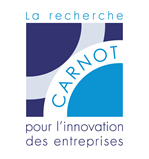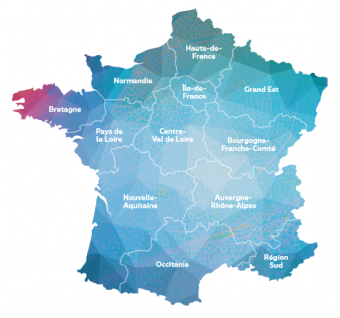Région Sud
Examples of partnerships with companies in the region
Enogia can convert even low-temperature heat into clean electricity
Partnership Carnot IFPEN TE - EnogiaEnogia and Carnot IFPEN TE are using enhanced Organic Rankine Cycle (ORC) modules to move beyond industrial uses and target the mobility sector.
Enogia can convert even low-temperature heat into clean electricity
Supporting Innovation
Enogia is a Marseille-based SME that harnesses ORC (Organic Rankine Cycle) technology to convert heat into electricity. This technology uses a Rankine thermodynamic cycle – most famously illustrated by the steam generator – together with an organic component. ORC has huge potential in the current energy policy environment but it needs to be green, affordable and as widely available as possible to have a real impact. With a helping hand from Carnot IFPEN Transports Energie, Enogia has already made its device technically and financially accessible for numerous SMEs. It is now possible to convert even low-temperature heat into electricity. The organic heat transfer fluid does not negatively impact the environment and the ORC micro-turbine is a big step towards making boat, truck and car engines cleaner and more energy efficient.
The client needs
Enogia has been designing and manufacturing stationary ORC applications since 2012. It quickly realised that it wanted to make these systems accessible to companies of all sizes.
An initial partnership with the Carnot institute enabled Enogia to develop a range of devices capable of producing between 5 and 200 kW of electric power. The heat transfer fluid – crucial for the project – was selected using simulators and test stands designed specifically by Enogia and IFPEN Transports Energie.
This joint initiative pinpointed a specific market need and culminated in an increase in Enogia’s workforce from 10 to over 35 people.
The Company is absolutely convinced of this technology’s potential for harnessing low-temperature heat and is now looking to incorporate it into boat, train and car engines. It is continuing to work with Carnot institute IFPEN Transports Energie towards a first industrial demo.
Partnership
Carnot IFPEN Transports Energie has been partnering the sustainable mobility challenges of big and small operators since 2006. Thanks to positive results in terms of innovation, tech transfer and industry partnerships it has become an internationally recognised expert. Carnot initially provided Enogia with computational and experimental resources. The two structures worked hand-in-hand to design a micro-turbo pump adapted to motor vehicle engine power that would be compact, eco-friendly and relatively cheap to produce.
A number of patents already filed – jointly owned by Enogia and IFPEN – are a testimony to a fruitful partnership between teams with common interests. Carnot’s commitment to this project is helping to grow an SME that is itself driving innovation in a market with high potential.
Data Moove enhances the tourist experience with improved sources of information using flow aggregation
Partnership Télécom & Société numérique and Data MooveSuch products have been jointly developed under a strategic research partnership with Carnot Télécom & Société numérique (EURECOM).
Data Moove enhances the tourist experience with improved sources of information using flow aggregation
Supporting Innovation
Tourism is now an important industry.. It is economically dependent to, a large extent though, on the most appropriate response given to increasingly demanding, global and mobile travellers. Very much aware of the territorial challenges ahead, Data Moove aims at providing current and correct information to the right people in the right place at the right time. The start-up pulled off the ambitious venture by aggregating wisely a rather heterogeneous collection of data and selecting relevant information while making them available via a kiosk or mobile extension by means of its City Moove app. The partnership with a Carnot institute will enable the enterprise to go further and build a brand ecosystem of services to support the travellers.
The client needs
The territorial reform and progression towards more sustainable and competitive tourism require the territories to mobilise their resources and optimise their economic benefits. Data Moove thus offers both the local authorities and private stakeholders a solution providing real-time information for the tourist as to the many activities he can take advantage of during his stay. From the day it was founded back in 2014, Data Moove has been exploiting large volumes of public and private sources related to tourism and culture, in accordance with applicable regulation and in compliance with the strictest quality criteria. Given the huge amount of data and various types of contents, the continuous updating through social networks as well as the obvious redundancies, R&D support has been indispensable. For its part, Carnot Télécom & Société numérique works on structuring the social media data, while modelling variations and relationships by use of semantic graphs. The partnership has started as early as 2015.
Partnership
EURECOM, an engineering school part of the Télécom & Société numérique Carnot Institute based at Sophia Antipolis** quickly learned how to work through and around the constraints and objectives experienced by Data Moove. The partnership has facilitated the development of a major app function that can, on the one hand, be auto-calibrated to assess the degree of similarity resulting in duplicate entries and, on the other hand, categorise events. Saint Barthélemy has been the first location equipped with the relevant software. The application can naturally be set to adapt to every single type of digital environment and connect automatically to existing application programs. Due to the huge potential of the global tourism market, a project of interactive dialogs was launched accordingly in 2018. EURECOM and Data Moove pursue a comprehensive strategic research partnership which includes, beyond the R&D component, a system of financial support for companies. The solution range has revealed support and commitment across the partners and a broad spectrum of the parties involved, including the tourist information services.
Through the STAR Carnot Institute, science meets amateur and pro football players
Partnership STAR Carnot Institute & WizwedgeWith the support of The Carnot Institute of Sport Science a passionate entrepreneur gives players a fair advantage with its newly launched customisable and high-performance shoe while keeping them safe from injury.
Through the STAR Carnot Institute, science meets amateur and pro football players
Supporting Innovation
Shoes with a customisable design aimed at improving specific sporting activities are current trend. The technique often involves moulding a sole as a carbon copy of the player’s own footprint for better postural balance and ideal comfort. The Wizwedge shoe concept offers an innovative technology mixing ergonomics with customisable options, where a partly removable Wedge, a component of the outer sole, a so-called technological space, adapts to each individual.
The instant hit with professional male and female football players laid out a concrete basis for the brand to open its first online store. Amateur football players can now benefit from biomechanical features for cushion, medium or dynamic exercises.
The client needs
Wizwedge has stemmed from the talent and interest of Jean-Luc Guer, an experienced football player. As far as he is concerned, the shoe is one of the major elements holding the key to the player’s footballing skills. Turned podiatrist, Jean-Luc Guer keeps contact with top athletes, while trying to develop and upgrade such outdated gear. He regularly tests and strives to improve his concept that would result in a shoe featuring the WedgeBox®, holding the removable Wedge. Once clarified, Jean-Luc Guer had to determine the ideal shape of the sole for perfect posture, improved balance and stability, to prevent injuries, at the same time, enable better performance. Located in Marseilles, the SME can make use of the Laboratory of Applied Biomechanics’ resources for his incisive analysis. Such co-operation has been awarded the First Prize for Sport & Health Innovation 2016.
Partnership
The STAR Carnot Institute places 8 Research units in the same organisational grouping revolving around sport, health and wellness. Among these, the Laboratory of Applied Biomechanics (LAB) provides researchers with a cross-cutting and multidisciplinary approach between Engineering Science and Medicine. Beside the usual aspects of the human body, the LAB investigates prevention and rehabilitation of traumatic injuries. It made therefore absolute sense for the LAB teams to get involved by endorsing the Wizwedge concept. All relevant platforms were made available to the SME to conduct studies, i.e. bone vibration frequencies during typical exercise regimens, human motion captures and numerical simulations. The LAB has carried out static and dynamic postural behaviors of all types of football players. Through his business expertise, the LAB has managed to determine the characteristics of one of the biomechanical elements able to respond to the various types of practices. The OEM (Original Equipment Manufacturer), for its part, can build upon such positive results by expanding innovative products from a fairly restricted distribution network into more appropriately priced lines fully accessible to amateurs.
Pellenc ST sold 20 machines to the biggest European waste treatment facilities
Partnership Irstea Carnot Institute - Pellenc STR&D strategy for the PellencST Carnot partnership becomes export triumph.
Pellenc ST sold 20 machines to the biggest European waste treatment facilities
Supporting Innovation
Near-infrared spectroscopy (NIRS) enables the optical analysis of various dry materials. In-depth analysis is needed to be able to discriminate between natural timber and painted wood, or between organic wastes and plastics. Innovation is above all about the ability to identify with a limited margin of error water-containing compounds. The colour-analysis / maximum-specimen-referencing / complex-algorithm-development combination has made it possible to put high-precision and high-performance optical sorting equipments onto the market.
The client needs
As of 2001 French start-up Pellenc ST has drawn on its analytical approach to describe the fruit ripening stages to tackle the very promising market for waste treatment. In 2009 the company responds to this challenge with the TRI+ project addressing food waste processing and wood recovery for recycling. Technological research and development effort is vast and essential for the very capable small and medium-sized Vaucluse-based robotics and infrared-processing specialist service provider. Completed in 2014 the project has culminated in a large number of sales, an Export Award as well as the selling of 20 machines to the biggest European waste treatment facilities in Naples.
Partnership
Irstea at Montpellier has been a long-standing partner of Pellenc SA, then clearly of Pellenc ST. The unique expertise of the lab is used to build a comprehensive knowledge base, therefore contributing to the Institute’s opportunity to publish significant articles in accordance with the contract’s confidentiality provisions. The research unit has been instrumental in promoting efforts to make the TRI+ project a success. Such endeavour could not have been supported by the start-up alone no matter how forceful. Concerned by the direct economic benefits of such partnership the teams have delegated 35 person-months over 4 years.
Regions
Bourgogne-Franche-Comté
Bretagne
Centre-Val de Loire
Grand Est
Hauts-de-France
Île-de-France
Normandie
Nouvelle-Aquitaine
Occitanie
Pays de la Loire
Région Sud


